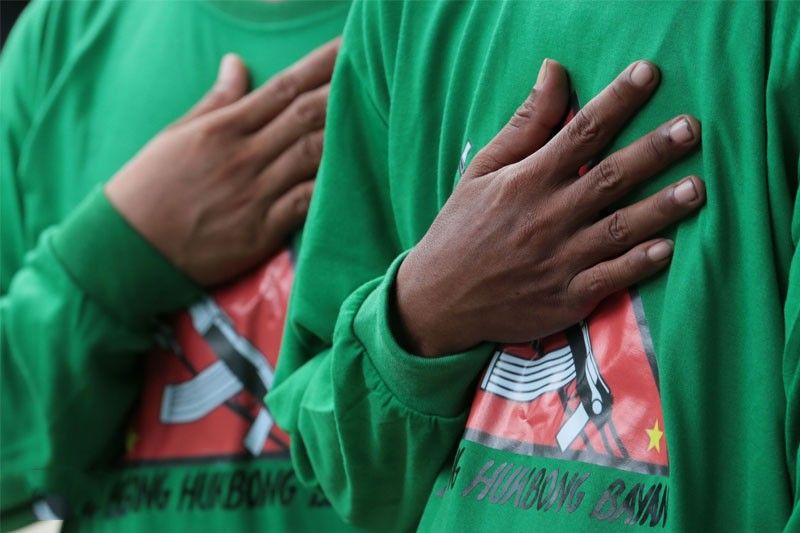DOJ to raise new issues in stronger case vs CPP-NPA

MANILA, Philippines — While the Department of Justice (DOJ) is dropping the option to file an appeal, the agency will raise new issues on its “stronger” proscription case against the Communist Party of the Philippines-New People’s Army (CPP-NPA) after a Manila court junked its bid to declare the communist group as a terrorist group.
In an interview with “The Chiefs” aired on Cignal TV’s One News last Friday, DOJ spokesman Mico Clavano disclosed that some issues raised in the previous petition against the CPP-NPA would be retained while new pieces of evidence and facts would be included, particularly incidents that have transpired from the time the DOJ filed the previous case until the present.
“We will also keep in the petition the fact that the CPP-NPA was designated as a terrorist group by no less than the United States Department of State, as well as by the European Union. And these are not light things. It’s heavy to be designated (as terrorists) by the US and the EU,” Clavano said.
“So these are the things that will stay in the petition, but of course, we will also have to strategize and make sure that the new petition that we will be filing before the Court of Appeals (CA) is much stronger, and we will have much more basis in fact and in law,” he added.
The DOJ will no longer file an appeal on Manila Regional Trial Court (RTC) Branch 19 Judge Marlo Magdoza-Malagar’s decision to junk their proscription case against the CPP-NPA as her basis in deciding the case was the Human Security Act of 2007, which was repealed by the Anti-Terrorism Act of 2020, according to Clavano.
The DOJ spokesman explained that the DOJ would file the new proscription case under the Anti-Terrorism Act of 2020 before the CA, which now has jurisdiction of proscription cases under the law.
Malagar recently junked the government’s bid to declare the CPP-NPA as a terrorist group as she emphasized that a perusal of the CPP-NPA’s program shows that it is organized not for the purpose of engaging in terrorism as alleged by the government.
She also stressed in her decision the danger of red-tagging which, according to Clavano, is a case of “obiter dictum” or things that were not alleged in the petition, but were ruled upon by the judge as he emphasized that they would not deal much on the issue.
“The DOJ filed a petition putting forth all the evidence and the judge was supposed to rule on the evidence only. So for her to have ruled on facts and issues that were not presented in the court by the DOJ is quite unnecessary, we feel,” Clavano said.
He added that they could not do anything about the judge’s decision but to respect it.
Asked what the impact of the court’s decision could be on some groups have that been designated as terrorist groups, Clavano explained that the only consequence is that the Anti-Money Laundering Council (AMLC) will have the power to freeze accounts and assets of the groups.
On the other hand, proscription, he said, is judicial in nature, which means that groups or individuals proscribed as terrorists will now be criminally liable, including actions or efforts to recruit members into the organizations proscribed as terrorists as stated under the Anti-Terrorism Act of 2020.
“So that’s clearly defined, what is designation and what is proscription, so it’s clear that the designation is much lighter (than proscription) because that’s purely administrative. It’s faster, it’s unilateral by the executive branch; on the other side, you have to pass it to the court,” the DOJ official added.
Clavano also pointed out that the junked petition against the CPP-NPA would no longer affect the petitions filed before the Supreme Court (SC) that questioned the constitutionality of the Anti-Terrorism Act of 2020 as “it already passed the constitutional muster.”
He added that the junked petition would also not “carry much water” on the new case they would file before the CA should the CPP-NPA use it against the DOJ, since the basis of DOJ’s new petition will be the Anti-Terror Act of 2020 and no longer the Human Security Act of 2007.
Clavano also dismissed issues that their action would be considered as double jeopardy since the proscription case is a sui generis or one-of-a-kind action as it does not apply to criminal cases and no criminal action, no imprisonment and no fine will be meted out by the decision of a judge.
He admitted, though, that it would be an interesting discussion and a good opportunity for the judiciary to decide on the nature of the proscription case.
- Latest
- Trending


























